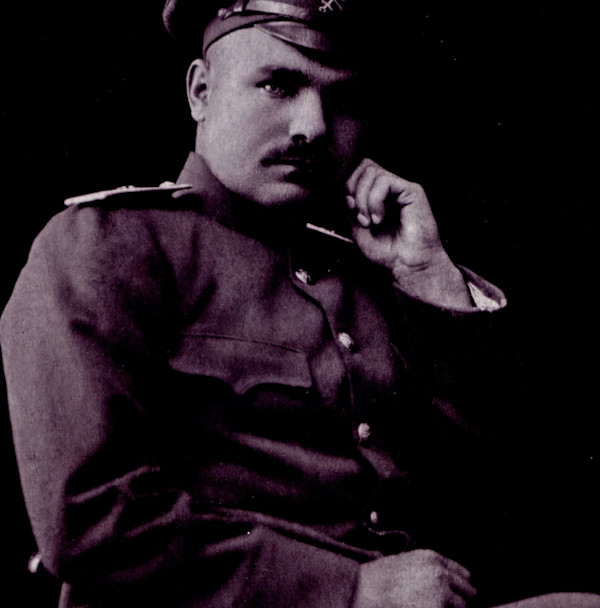Russian citizen Georgy Shakhet is appealing the death sentence handed down to his grandfather, Pavel Zabotin, by a “troika” of the Joint State Political Directorate (OGPU) in 1933. Shakhet’s interests are being represented by lawyers from the Memorial Human Rights Center in conjunction with Team 29 (an informal human rights association of lawyers and journalists).
Since February 2017, Georgy Shakhet has been seeking access to the criminal case file of his grandfather, who was executed under the All-Russian Central Executive Committee (VTsIK) decree of August 7, 1932, “On the Protection of the Property of State Enterprises, Kolkhozes and Cooperatives and the Consolidation of Socialist Property”—the infamous “Law of Three Spikelets.”

Pavel Zabotin
As required by the legal procedure, Shakhet applied for access to the archives of the Main Directorate of the Ministry of Internal Affairs (GU MVD) for the Moscow Oblast and was denied on the grounds that Pavel Zabotin had not been rehabilitated. The district and Moscow city courts upheld this decision. When Shakhet then filed a request with the Moscow Prosecutor’s Office for Zabotin’s rehabilitation, the prosecutor’s office refused, citing that Zabotin was not convicted for political motives but as a common criminal—although he was sentenced by an OGPU “troika,” the charge was of a general criminal nature: theft of construction materials and forgery of business documents.
During the review of Shakhet’s first lawsuit in the Golovinsky Court, the GU MVD was forced to partially disclose materials from Pavel Zabotin’s archival case file to the court. From them, it became known that he was accused of “submitting fictitious invoices for an amount exceeding 11,000 rubles, as well as the theft, jointly with other persons, of 20,000 bricks and 20 crates of glass with a total value of 22,400 rubles.”
The “Law of Three Spikelets” treated the theft of state property as counter-revolutionary activity by “enemies of the people.” The very first article of Russia’s “Law on the Rehabilitation of Victims of Political Repression” explains that political repression is considered “coercive measures against persons... recognized as socially dangerous to the state or the political system on class, social, national, religious, or other grounds.” Moreover, the third article of the law states that all those who were convicted “by decisions of the Cheka, GPU-OGPU, UNKVD-NKVD, MGB, MVD, the prosecutor’s office and their collegiums, commissions, ‘special councils,’ ‘dvoikas,’ ‘troikas,’ and other bodies that exercised judicial functions” are subject to rehabilitation.
To recognize the existence of political repression, it is necessary that the person was persecuted not because (or not only because) they committed a crime, but because they were allegedly a socially alien element to the state, a so-called “enemy of the people.” This is precisely what Pavel Zabotin became from the state’s point of view when he encroached on state property, and that is why he was executed. If, for example, he had stolen a cow from a neighbor, he would have gotten off much more lightly—with a punishment under a criminal statute, and he would not be subject to rehabilitation. But in the case of Zabotin, sentenced by an extrajudicial body (a “troika”) to a completely groundless punishment (execution), the fact of political repression is obvious.
Lawyers from the Memorial HRC and Team 29 filed a lawsuit to declare the prosecutor’s office’s decision illegal, but the Tagansky District Court of Moscow also rejected this claim, stating that it had no right to interfere in the prosecutor’s decisions.
The lawyers then decided to appeal the 1933 verdict and filed a corresponding cassation appeal on behalf of Georgy Shakhet with the Moscow City Court.
To appeal, access to the case materials is required, but for now, the lawyers only have the report that the MVD provided to the court when they first tried to gain such access. The report states that Zabotin was convicted for the theft of construction materials as part of a group, as stated in the verdict, of “former merchants-lishentsy.”
After analyzing the VTsIK decree of August 7, 1932, the lawyers concluded that its effect extends only to cargo on railway and water transport, as well as the property of kolkhozes and cooperatives. The property allegedly stolen by Zabotin was neither railway, nor water, nor kolkhoz property.
An “Instruction on the Application of the Decree,” issued after its adoption, expanded the scope of the “Law of Three Spikelets” to cover what Zabotin was accused of. But the instruction was preceded by the word “Secret”; it was not published, and only the criminal-executive bodies knew about it—the courts, the prosecutor’s office, the OGPU, and operational sectors.
“Can a person be executed based on a secret law?”—this is the main question of the cassation appeal, which the Moscow City Court must answer in the near future.
Since all attempts to gain access to the archival materials of Zabotin’s case have failed, the lawyers hope to gain access to the documents during the court hearing. The documents will make it possible to determine how factually substantiated the accusation against Zabotin is.
Based on reporting from the Memorial Human Rights Center.